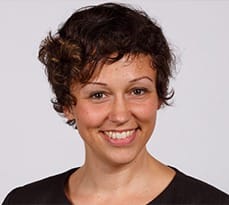There’s so much more to finance than just returns, says alternative finance expert Tiara Letourneau (MFin 2014). She believes that, used wisely, financial systems can make the world a better place, on both an individual and a global level.
Read Tiara Letourneau’s Twitter profile and you’ll see a neat summing up: Buddhist, banker, big picture thinker. The three don’t always go together, she admits, but her career in alternative finance encapsulates them all.

“I’ve always felt that finance serves humanity, not the other way around,” she says. “When you are a finance specialist, your job is to find returns. And that’s very important. But when we forget that those returns are in service to something – whether it’s at a global or an individual level – then we lose the bigger picture. My jobs have shown me that finance can serve everyone, from First Nations people who are building communities after having their communities taken away, to small business owners in Africa.”
Letourneau says she has never had a clear career path. She has simply followed her passions. She wanted to see the world, so studied international business as an undergraduate. She had an interest in development but didn’t want to work in relief or aid but rather in a sector where people were helping themselves. This interest led her to her first job as head of international partnerships at microfinance institution ENDA Inter-Arabe in Tunisia, helping individuals secure small loans to help them set up businesses.
She loved the work and had every intention of remaining in microfinance, but then had to return to Canada to be with her family. However, her next job, a commercial account manager with the Royal Bank of Canada, led her unexpectedly to a very similar area – the bank’s Aboriginal desk, managing the credit and investing needs of First Nations governments and businesses.
“One of Canada’s greatest challenges is that we are a very successful and multicultural country – with the exception of the integration of our First Nations people,” she explains. “There are more than 600 First Nations across the country. They are extremely varied in terms of their legal structure. Some of them are wards of the crown, some have their own treaties and some are nations within the nation.”
The First Nations are hugely diverse. Some have multi-billion dollar real estate development in cities like Vancouver. Others don’t have access to clean water. “But they are all communities which were shunted into a backseat role by the state and are now taking control of their own futures. So it’s a transformative time in the country. It was amazing to be able to assist these communities as they put together their plans and started to execute them.”
This role led to Letourneau being awarded an Action Canada Fellowship, an award given to around 20 young emerging leaders every year. Each Fellow is put through a rigorous communications and policy training programme to teach them how the wheels of Canadian government work. They are each assigned a group task, and hers was to study the problem of Canadian household debt.
Around that time the financial crisis hit and Letourneau found herself taking a very different view of the financial system. “I went from being very passionate about how financial systems could reduce vulnerability among the poor to all of a sudden realising that the macrosystems were a disaster. I did a lot of background reading and I decided that what I really needed was to become literate in finance. I wanted the passion I had for microfinancial systems to be transferred into macrofinancial systems.”
She applied to the Masters of Finance programme at CJBS. It was the only school she applied to, she says, as she didn’t just want quantitative skills, but context. “I could rave about the programme all day,” she says. “It was incredible to be able to sit next to, say, the head of an entire region at Citibank at dinner one day, and discuss issues arising from the Islamic banking system with an expert the next. And it wasn’t just the experts that gave me the context – it was my fellow students, all of who were from an incredibly diverse range of backgrounds.”
Letourneau is now based in Seoul, South Korea, in a new role – strategist at the Green Climate Fund. It’s a global platform, accountable to the United Nations, set up by 194 governments to respond to climate change by investing in low-emission and climate-resilient development.
“We need the private sector to invest in projects that will enable the switch to low-emissions technologies,” says Letourneau. “At the moment, the risks are too high and the returns are too low. So I’m bringing the CJBS finance skills to the table to work out how we can use a relatively small amount of money – $10bn – to become a catalyst in driving this change.”
It’s a big challenge – one of the biggest. And to Letourneau, it’s yet another opportunity to use financial systems to make the world a better place. “It’s very rewarding because when you are able to create a success, then you change a country’s prospects. You change communities. You change what other investors will see as possible in the future – and I’m privileged to be a part of that.”
Tiara is interested in meeting…
…people who are using finance in innovative ways or for social impact.


